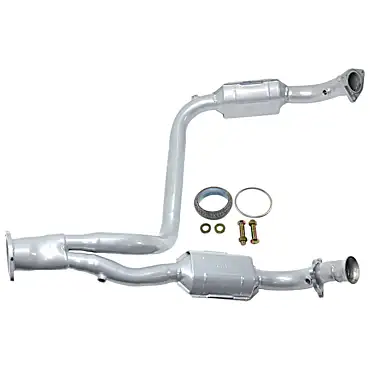Answers
May 19, 2023 - 11:37 AM
Most all 48 state approved can pass in 50 states. And work fine everywhere.
C.A.R.B.
California.Air Resource Board.
Is a $400 minimum Ca,Ny state taxon catalytic converters..
If you haven't failed a smog it's not a problem.
Except when failed because of Cat they require the stamp tag/tax to be certified.
I replaced mine in Nevada with 48 state .
before it ever failed a test. Upon moving back to CA. It passed fine. They had no reason to certify because it passed. They had no reason to visually inspect them.
On a 2004 Sienna It saved $900 Carb taxation on a pair of cats.
C.A.R.B.
California.Air Resource Board.
Is a $400 minimum Ca,Ny state taxon catalytic converters..
If you haven't failed a smog it's not a problem.
Except when failed because of Cat they require the stamp tag/tax to be certified.
I replaced mine in Nevada with 48 state .
before it ever failed a test. Upon moving back to CA. It passed fine. They had no reason to certify because it passed. They had no reason to visually inspect them.
On a 2004 Sienna It saved $900 Carb taxation on a pair of cats.

May 22, 2023 - 01:27 AM
Hi there!
CARB catalytic converters are designed to meet the emission standards set by the CARB-compliant States, which differ from EPA standards. The converter themselves are constructed differently. There are certain factors to consider like compatibility, legal considerations, engine performance and potential damage, and possible replacement of other parts for the EPA converter to work.
I recommend consulting with a trusted local mechanic and contacting the North Carolina Department of Environmental Quality or the North Carolina Division of Motor Vehicles. They can provide specific information about the regulations and requirements for catalytic converters in your area and advise you on the best course of action for your particular situation.
CARB catalytic converters are designed to meet the emission standards set by the CARB-compliant States, which differ from EPA standards. The converter themselves are constructed differently. There are certain factors to consider like compatibility, legal considerations, engine performance and potential damage, and possible replacement of other parts for the EPA converter to work.
I recommend consulting with a trusted local mechanic and contacting the North Carolina Department of Environmental Quality or the North Carolina Division of Motor Vehicles. They can provide specific information about the regulations and requirements for catalytic converters in your area and advise you on the best course of action for your particular situation.







Add New Comment